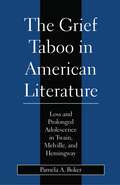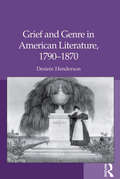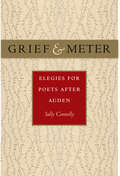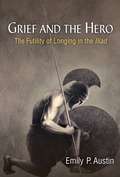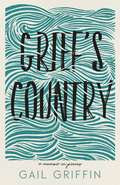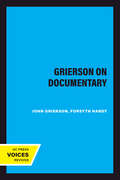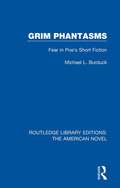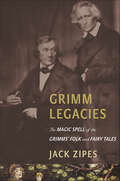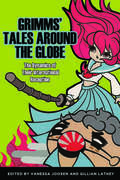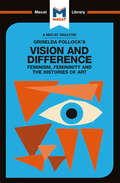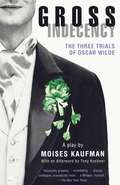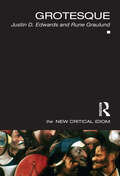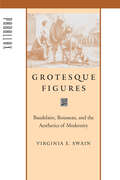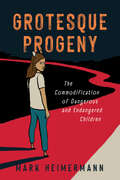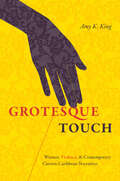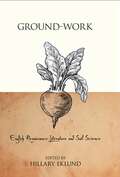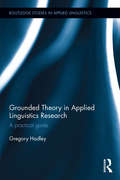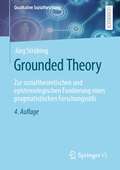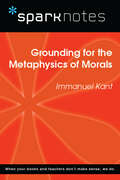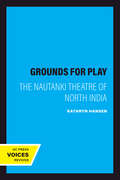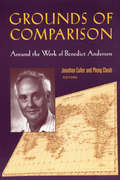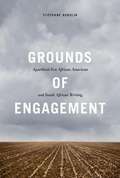- Table View
- List View
Grief Taboo in American Literature: Loss and Prolonged Adolescence in Twain, Melville, and Hemingway (Literature and Psychoanalysis)
by Pamela A. BokerIn this feminist rereading, Pamela A. Boker examines the prolonged adolescence of the American male in the works of three quintessential American male authors, Herman Melville, Mark Twain, and Ernest Hemingway, through a highly original psychoanalytic inquiry. Challenging conventional interpretations, Boker argues that failing to mourn loss and repressing one's true emotions do not demonstrate a heroic capacity, but rather, a damaging inability to work through psychological wounds that have not healed.Boker locates in the lives and fiction of Melville, Twain, and Hemingway the suicidal orphan, the adolescent simultaneously seeking masculine maturity and escaping from it. She reveals a world of perpetual adolescence, repressed grief, and repudiation of feminine identification. All three writers lacked intimate relationships with their fathers and remained conflicted emotionally, a condition which profoundly influenced their creative work.In Melville's life and work, readers encounter aggressive and guilt ridden characters, trapped in infantile and early adolescent development. Similarly, Mark Twain enlisted humor and nostalgic fantasies of an ideal past in his avoidance of difficult emotions. Silent references and vague allusions to painful feelings proliferate the fiction of Hemingway. In seeking out the repressed vulnerability of the tough guy in American literature, Boker finds it where it is most vigorously denied.
Grief and Genre in American Literature, 1790-1870
by Desirée HendersonFocusing on the role of genre in the formation of dominant conceptions of death and dying, Desirée Henderson examines literary texts and social spaces devoted to death and mourning in eighteenth- and nineteenth-century America. Henderson shows how William Hill Brown, Susanna Rowson, and Hannah Webster borrowed from and challenged funeral sermon conventions in their novelistic portrayals of the deaths of fallen women; contrasts the eulogies for George Washington with William Apess's "Eulogy for King Philip" to expose conflicts between national ideology and indigenous history; examines Frederick Douglass's use of the slave cemetery to represent the costs of slavery for African American families; suggests that the ideas about democracy materialized in Civil War cemeteries and monuments influenced Walt Whitman's war elegies; and offers new contexts for analyzing Elizabeth Stuart Phelps's The Gates Ajar and Emily Dickinson's poetry as works that explore the consequences of female writers claiming authority over the mourning process. Informed by extensive archival research, Henderson's study eloquently speaks to the ways in which authors adopted, revised, or rejected the conventions of memorial literature, choices that disclose their location within decisive debates about appropriate gender roles and sexual practices, national identity and citizenship, the consequences of slavery, the nature of democratic representation, and structures of authorship and literary authority.
Grief and Meter: Elegies for Poets after Auden
by Sally ConnollyThe elegizing of poets is one of the oldest and most enduring traditions in English poetry. Many of the most influential and best-known poems in the language--such as Milton's "Lycidas," Shelley's "Adonais," and Auden's "In Memory of W. B. Yeats"--are elegies for poets.In Grief and Meter, Sally Connolly offers the first book to focus on these poems and the role they play as a specific subgenre of elegy, establishing a genealogy of poetry that traces the dynamics of influence and inheritance in twentieth- and twenty-first-century poetry. She identifies a distinctive and significant Anglo-American line of descent that resonates in these poems, with British poets often elegizing American ones, yet rarely the other way around. Further, she reveals how these poems function as a means of mediating, effecting, and tracing transatlantic poetic exchanges.The author frames elegies for poets as a chain of commemoration and inheritance, each link independent, but when seen as part of the "golden chain," signifying a larger purpose and having a correspondingly greater strength. Grief and Meter provides a compelling account of how and why these poems are imbued with such power and significance.
Grief and Women Writers in the English Renaissance
by Elizabeth HodgsonGrief and Women Writers in the English Renaissance anatomizes the era's powerful but troubling links between the forgettable dead and the living mourners who are implicated in the same oblivion. Four major women writers from 1570 to 1670 construct these difficult bonds between the spectral dead and the liminal mourner. Mary Sidney Herbert, Countess of Pembroke, reinvents the controversial substitutions of aristocratic funerals . New Protestant ideologies of the sainted dead connect devotional mourning and patronage in Aemelia Lanyer's writing. Mary Wroth's verse enacts a uniquely exalted, imaginative melancholy in which Jacobean subjects dissolve into their mourning artifacts. Among the precarious political mourners of the later half of the period , Katherine Philips's lyric verse plays the shell game of private grief. Forgetting, being forgotten, and being dead are risks that the dead and the living ironically share in these central texts by the English Renaissance's most illustrious women writers.
Grief and the Hero: The Futility of Longing in the Iliad
by Emily P. AustinGrief and the Hero examines Achilles’ experience of the futility of grief in the context of the Iliad’s study of anger. No action can undo his friend Patroklos’ death, but the experience of death drives him to behave as though he can achieve something restorative. Rather than assuming that grief gives rise to anger, as most scholars have done, Grief and the Hero pays close attention to the poem’s representation of the origin of these emotions. In the Iliad, only Achilles’ grief for Patroklos is joined with the word pothê, “longing”; no other grief in the poem is described with this term. The Iliad depicts Achilles’ grief as the rupture of shared life—an insight that generates a new way of reading the epic. Achilles’ anguish drives him to extremes, oscillating between self-isolation and seeking communal expressions of grief; between weeping abundantly and relentlessly pursuing battle; between varied threats of mutilation, deeds of vengeance, and other vows. Yet his yearning for life shared with Patroklos is the common denominator. Here lies the profound insight of the Iliad. All of Achilles’ grief-driven deeds arise from his longing for life with Patroklos, and thus all of these deeds are, in a deep sense, futile. He yearns for something unattainable—undoing the reality of death. Grief and the Hero will appeal not only to scholars and students of Homer but to all humanists. Loss, longing, and even revenge touch many human lives, and the insights of the Iliad have broad resonance.
Grief's Country: A Memoir in Pieces (Made in Michigan Writers Series)
by Gail GriffinGail Griffin had only been married for four months when her husband’s body was found in the Manistee River, just a few yards from their cabin door. The terrain of memoir is full of stories of grief, though Grief’s Country: A Memoir in Pieces is less concerned with the biography of a love affair than with the lived phenomenon of grief itself—what it does to the mind, heart, and body; how it functions almost as an organism. The book’s intimacy is at times nearly disarming; its honesty about struggling through grief’s country is unfailing. The story is told "in pieces" in that it is ten essays of varying forms, punctuated by four original poems, that examine facets of traumatic grief, memory, and survival. While a reader will perceive a forward trajectory, the book resists anything like a clear chronology, offering a picture of deep grief as something that defies the linear and explodes time. "A Strong Brown God" tells the story of two of Griffin’s significant relationships—with her husband, Bob, and with the Manistee River—and includes the history of what drew them all together. "Grief’s Country" follows Griffin from the morning after Bob’s death through the first disoriented, fractured months of PTSD. "Heartbreak Hotel" takes Griffin on a tragicomical flight the first Christmas after Bob’s death to a Jamaican resort—which includes an unscheduled stop at Graceland—where she contemplates the notions of home and haven. Grief’s Country will speak directly to anyone who has lost a dearly loved one, offering not one story but ten different faces of grief to contemplate. It will also appeal to general readers of memoir, including teachers and students of nonfiction, especially as it includes a variety of formal models. Those interested in the subject area of death and dying will find it useful as a book that bypasses recovery narratives, truisms, and "stages of grief" to get as close as possible to the experience itself.
Grierson on Documentary
by John GriersonThis title is part of UC Press's Voices Revived program, which commemorates University of California Press’s mission to seek out and cultivate the brightest minds and give them voice, reach, and impact. Drawing on a backlist dating to 1893, Voices Revived makes high-quality, peer-reviewed scholarship accessible once again using print-on-demand technology. This title was originally published in 1966.
Grim Phantasms: Fear in Poe's Short Fiction (Routledge Library Editions: The American Novel #3)
by Michael L. BurduckThis title, originally published in 1992, presents an assessment of Poe’s short stories that treat horror, and more specifically how he manipulated the conventions of that horror to register subtly on the fears and phobias of his reading audiences. Short-stories examined include The Black Cat, Hop-Frog and Morella. This title also explores the theories of Stephen King and Benjamin Rush on the horror genre. This title will be of great interest to students of American Literature.
Grimm Legacies: The Magic Spell of the Grimms' Folk and Fairy Tales
by Jack ZipesIn Grimm Legacies, esteemed literary scholar Jack Zipes explores the legacy of the Brothers Grimm in Europe and North America, from the nineteenth century to the present. Zipes reveals how the Grimms came to play a pivotal and unusual role in the evolution of Western folklore and in the history of the most significant cultural genre in the world—the fairy tale.Folklorists Jacob and Wilhelm Grimm sought to discover and preserve a rich abundance of stories emanating from an oral tradition, and encouraged friends, colleagues, and strangers to gather and share these tales. As a result, hundreds of thousands of wonderful folk and fairy tales poured into books throughout Europe and have kept coming. Zipes looks at the transformation of the Grimms' tales into children's literature, the Americanization of the tales, the "Grimm" aspects of contemporary tales, and the tales' utopian impulses. He shows that the Grimms were not the first scholars to turn their attention to folk tales, but were vital in expanding readership and setting the high standards for folk-tale collecting that continue through the current era. Zipes concludes with a look at contemporary adaptations of the tales and raises questions about authenticity, target audience, and consumerism.With erudition and verve, Grimm Legacies examines the lasting universal influence of two brothers and their collected tales on today's storytelling world.
Grimms' Tales around the Globe: The Dynamics of Their International Reception
by Vanessa Joosen Gillian LatheyGrimms' fairy tales are among the best-known stories in the world, but the way they have been introduced into and interpreted by cultures across the globe has varied enormously. In Grimms' Tales around the Globe, editors Vanessa Joosen and Gillian Lathey bring together scholars from Asia, Europe, and North and Latin America to investigate the international reception of the Grimms' tales. The essays in this volume offer insights into the social and literary role of the tales in a number of countries and languages, finding aspects that are internationally constant as well as locally particular. In the first section, Cultural Resistance and Assimilation, contributors consider the global history of the reception of the Grimms' tales in a range of cultures. In these eight chapters, scholars explore how cunning translators and daring publishers around the world reshaped and rewrote the tales, incorporating them into existing fairy-tale traditions, inspiring new writings, and often introducing new uncertainties of meaning into the already ambiguous stories. Contributors in the second part, Reframings, Paratexts, and Multimedia Translations, shed light on how the Grimms' tales were affected by intermedial adaptation when traveling abroad. These six chapters focus on illustrations, manga, and film and television adaptations. In all, contributors take a wide view of the tales' history in a range of locales--including Poland, China, Croatia, India, Japan, and France. Grimms' Tales around the Globe shows that the tales, with their paradox between the universal and the local and their long and world-spanning translation history, form a unique and exciting corpus for the study of reception. Fairy-tale and folklore scholars as well as readers interested in literary history and translation will appreciate this enlightening volume.
Griselda Pollock's Vision and Difference: Feminism, Femininity and Histories of Art (The Macat Library)
by Karina JakubowiczVision and Difference, published in 1988, is one of the most significant works in feminist visual culture arguing that feminist art history of is a political as well as academic endeavour. Pollock expresses how images are key to the construction of sexual difference, both in visual culture and in broader societal experiences.Her argument places feminist theory at the centre of art history, proffering the idea that a feminist understanding of art history is an analysis of art history itself. This text remains key not only to understand feminine art historically but to grasp strategies for representation in the future and adding to its contemporary value.
Gross Indecency: The Three Trials of Oscar Wilde
by Moises KaufmanA theatrical depiction of the Oscar Wilde trials that took place in the late 1800s. The famous playwright and renowned wit was publicly tried for his rumoured relationship with Lord Alfred Douglas. His sentencing shaped society's view of homosexuality as a criminal act.
Grotesque (The New Critical Idiom)
by Rune Graulund Justin EdwardsGrotesque provides an invaluable and accessible guide to the use (and abuse) of this complex literary term. Justin D. Edwards and Rune Graulund explore the influence of the grotesque on cultural forms throughout history, with particular focus on its representation in literature, visual art and film. The book: presents a history of the literary grotesque from Classical writing to the present examines theoretical debates around the term in their historical and cultural contexts introduce readers to key writers and artists of the grotesque, from Homer to Rabelais, Shakespeare, Carson McCullers and David Cronenberg analyses key terms such as disharmony, deformed and distorted bodies, misfits and freaks explores the grotesque in relation to queer theory, post-colonialism and the carnivalesque. Grotesque presents readers with an original and distinctive overview of this vital genre and is an essential guide for students of literature, art history and film studies.
Grotesque Figures: Baudelaire, Rousseau, and the Aesthetics of Modernity (Parallax: Re-visions of Culture and Society)
by Virginia E. SwainCharles Baudelaire is usually read as a paradigmatically modern poet, whose work ushered in a new era of French literature. But the common emphasis on his use of new forms and styles overlooks the complex role of the past in his work. In Grotesque Figures, Virginia E. Swain explores how the specter of the eighteenth century made itself felt in Baudelaire's modern poetry in the pervasive textual and figural presence of Jean-Jacques Rousseau. Not only do Rousseau's ideas inform Baudelaire's theory of the grotesque, but Rousseau makes numerous appearances in Baudelaire's poetry as a caricature or type representing the hold of the Enlightenment and the French Revolution over Baudelaire and his contemporaries. As a character in "Le Poème du hashisch" and the Petits Poèmes en prose, "Rousseau" gives the grotesque a human form.Swain's literary, cultural, and historical analysis deepens our understanding of Baudelaire and of nineteenth-century aesthetics by relating Baudelaire's poetic theory and practice to Enlightenment debates about allegory and the grotesque in the arts. Offering a novel reading of Baudelaire's ambivalent engagement with the eighteenth-century, Grotesque Figures examines nineteenth-century ideological debates over French identity, Rousseau's political and artistic legacy, the aesthetic and political significance of the rococo, and the presence of the grotesque in the modern.
Grotesque Progeny: The Commodification of Dangerous and Endangered Children (Cultures of Childhood)
by Mark HeimermannIn contemporary Western society, childhood appears more protected than ever to the casual onlooker. Yet, we are increasingly fascinated by narratives in which children are depicted as unsettling beings, both dangerous and endangered, sometimes chaotic or even evil. In Grotesque Progeny: The Commodification of Dangerous and Endangered Children, author Mark Heimermann argues that these representations reflect cultural anxiety regarding a shifting conception of youths from emotional assets to economic ones. In the early to mid-twentieth century, children, who had previously been viewed in part as economic investments, were largely moved out of the work force. For decades, children were instead valued primarily as emotional assets. However, the rise of neoliberal capitalism in the 1970s and 1980s, and its eventual proliferation throughout our politics and our lives, has led to the widespread commodification of social arenas previously kept separate from the capitalist quest for profit. Not even children have escaped being objectified and dehumanized in this manner. Heimermann examines a variety of texts that center on children and adolescents who are marked as different from the adult characters and consequently viewed as grotesque. Chapters cover Jeff Lemire’s Sweet Tooth, M. R. Carey’s The Girl with All the Gifts, Katherine Dunn’s Geek Love, Richard Starkings’s Elephantmen, Kazuo Ishiguro’s Never Let Me Go, and more. Because the young characters are not viewed as equal members of society, they must either strike back at those who commodify them or risk facing a lifetime of dehumanization. Grotesque Progeny argues that these monstrous depictions reveal societal unease over shortsighted economic and political thinking, the exploitation of children, and the changing nature of childhood. The book addresses a growing concern over which spaces ought to be excluded or removed from the harsh valuations of neoliberalism.
Grotesque Touch: Women, Violence, and Contemporary Circum-Caribbean Narratives
by Amy KingIn this book, Amy K. King examines how violence between women in contemporary Caribbean and American texts is rooted in plantation slavery. Analyzing films, television shows, novels, short stories, poems, book covers, and paintings, King shows how contemporary media reuse salacious and stereotypical depictions of relationships between women living within the plantation system to confront its legacy in the present. The vestiges of these relationships--enslavers and enslaved women, employers and domestic servants, lovers and rivals--negate characters' efforts to imagine non-abusive approaches to power and agency. King's work goes beyond any other study to date to examine the intersections of gender, sexuality, race, ethnicity, class, ability, and nationality in U.S. and Caribbean depictions of violence between women in the wake of slavery.
Ground-Work: English Renaissance Literature and Soil Science (Medieval & Renaissance Literary Studies)
by Hillary EklundHow does soil, as an ecological element, shape culture? With the sixteenth-century shift in England from an agrarian economy to a trade economy, what changes do we see in representations of soil as reflected in the language and stories during that time? This collection brings focused scholarly attention to conceptions of soil in the early modern period, both as a symbol and as a feature of the physical world, aiming to correct faulty assumptions that cloud our understanding of early modern ecological thought: that natural resources were then poorly understood and recklessly managed, and that cultural practices developed in an adversarial relationship with natural processes. Moreover, these essays elucidate the links between humans and the lands they inhabit, both then and now.
Ground-Work: English Renaissance Literature and Soil Science (Medieval & Renaissance Literary Studies)
by Hillary EklundHow does soil, as an ecological element, shape culture? With the sixteenth-century shift in England from an agrarian economy to a trade economy, what changes do we see in representations of soil as reflected in the language and stories during that time? This collection brings focused scholarly attention to conceptions of soil in the early modern period, both as a symbol and as a feature of the physical world, aiming to correct faulty assumptions that cloud our understanding of early modern ecological thought: that natural resources were then poorly understood and recklessly managed, and that cultural practices developed in an adversarial relationship with natural processes. Moreover, these essays elucidate the links between humans and the lands they inhabit, both then and now.
Grounded Theory in Applied Linguistics Research: A practical guide (Routledge Studies in Applied Linguistics)
by Gregory HadleyThis volume demystifies the procedures and practical uses of Grounded Theory, a well-established research methodology used around the world today by social scientists, teachers, and qualitative researchers. Intended for graduate students, supervisors, and researchers, it provides readers with the tools for understanding, justifying, and disseminating new theoretical insights for the Applied Linguistics community and beyond.
Grounded Theory: Zur sozialtheoretischen und epistemologischen Fundierung eines pragmatistischen Forschungsstils (Qualitative Sozialforschung)
by Jörg StrübingWenig wurde bislang über die erkenntnistheoretische Fundierung der Grounded Theory in der pragmatischen Sozialphilosophie und die daraus resultierenden Konsequenzen für das Verständnis der methodologischen Konzeption wie der praktischen Verfahren geschrieben. Der Band schließt diese Lücke, indem das Erkenntnismodell, ausgehend von den Arbeiten von C.S. Peirce, J. Dewey, G.H. Mead und W. James, vorgestellt und den Spuren nachgegangen wird, die dieses Modell als Geltungsbegründung in der Methodologie der Grounded Theory hinterlassen hat. Dabei geht der Text auch auf die gravierenden methodologischen Unterschiede zwischen der von Anselm L. Strauss geprägten und der von Barney G. Glaser vertretenen Variante von Grounded Theory ein und beschäftigt sich mit wesentlichen Weiterentwicklungen einer pragmatistischen Grounded Theory im Kontext postmodernen Denkens. Die vorliegende, vierte Auflage schließt zudem den aktuellen Diskurs um die Etablierung ansatzübergreifender Gütekriterien qualitativen Forschens an die Grounded Theory-immanenten Strategien zur Qualitätssicherung an. Forschende erhalten damit eine wertvolle Argumentationshilfe für die Legitimation ihrer empirischen Designs.
Grounding for the Metaphysics of Morals (SparkNotes Philosophy Guide)
by SparkNotesGrounding for the Metaphysics of Morals (SparkNotes Philosophy Guide) Making the reading experience fun! SparkNotes Philosophy Guides are one-stop guides to the great works of philosophy–masterpieces that stand at the foundations of Western thought. Inside each Philosophy Guide you&’ll find insightful overviews of great philosophical works of the Western world.
Grounds for Play: The Nautanki Theatre of North India
by Kathryn HansenThe nautanki performances of northern India entertain their audiences with often ribald and profane stories. Rooted in the peasant society of pre-modern India, this theater vibrates with lively dancing, pulsating drumbeats, and full-throated singing. In Grounds for Play, Kathryn Hansen draws on field research to describe the different elements of nautanki performance: music, dance, poetry, popular story lines, and written texts. She traces the social history of the form and explores the play of meanings within nautanki narratives, focusing on the ways important social issues such as political authority, community identity, and gender differences are represented in these narratives.Unlike other styles of Indian theater, the nautanki does not draw on the pan-Indian religious epics such as the Ramayana or the Mahabharata for its subjects. Indeed, their storylines tend to center on the vicissitudes of stranded heroines in the throes of melodramatic romance. Whereas nautanki performers were once much in demand, live performances now are rare and nautanki increasingly reaches its audiences through electronic media—records, cassettes, films, television. In spite of this change, the theater form still functions as an effective conduit in the cultural flow that connects urban centers and the hinterland in an ongoing process of exchange.
Grounds of Comparison: Around the Work of Benedict Anderson
by Jonathan Culler Pheng CheahBenedict Anderson, professor at Cornell and specialist in Southeast Asian studies, is best known for his book Imagined Communities: Reflections on the Origin and Spread of Nationalism (1991). It is no understatement to say that this is one of the most influential books of the last twenty years. Widely read both by social scientists and humanists, it has become an unavoidable document. For people in the humanities, Anderson is particularly interesting because he explores the rise of nationalism in connection with the rise of the novel.
Grounds of Engagement: Apartheid-Era African-American and South African Writing
by Stephane RobolinPart literary history, part cultural study, Grounds of Engagement examines the relationships and exchanges between black South African and African American writers who sought to create common ground throughout the antiapartheid era. Stéphane Robolin argues that the authors' geographic imaginations crucially defined their individual interactions and, ultimately, the literary traditions on both sides of the Atlantic. Subject to the tyranny of segregation, authors such as Richard Wright, Bessie Head, Langston Hughes, Gwendolyn Brooks, Keorapetse Kgositsile, Michelle Cliff, and Richard Rive charted their racialized landscapes and invented freer alternative geographies. They crafted rich representations of place to challenge the stark social and spatial arrangements that framed their lives. Those representations, Robolin contends, also articulated their desires for black transnational belonging and political solidarity. The first book to examine U.S. and South African literary exchanges in spatial terms, Grounds of Engagement identifies key moments in the understudied history of black cross-cultural exchange and exposes how geography serves as an indispensable means of shaping and reshaping modern racial meaning.
Groundwork for College Reading (3rd edition)
by Bill BroderickGroundwork for College Reading, Third Edition, provides ten word and reading skills to help developmental college students, English as a second language students, and Adult Basic Education students to become independent readers and thinkers. Through an appealing collection of readings and a carefully designed series of activities and tests, students receive considerable guided practice in the skills. The result is an integrated approach to learning that will bring about better readers and stronger thinkers.
